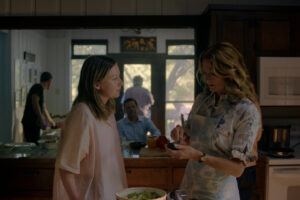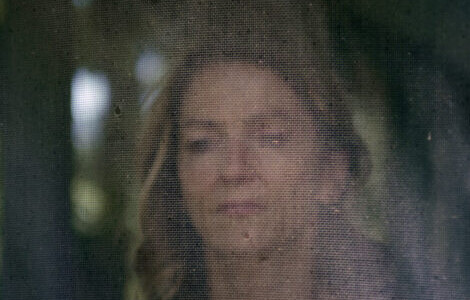Families are microcosms of chaos. Particularly if you feel like an outsider within your own unit. Nothing quite fits, or sounds quite right, and you observe things most either miss completely or would prefer not to dwell on. Family gatherings begin to feel like stage plays where none of the costumes fit right, and the setting feels just this side of reality. The idea of marking the gathering with a family portrait becomes its own kind of surreal bend to the truth.
Writer/director Lucy Kerr’s stunning feature debut, FAMILY PORTRAIT, perfectly encapsulates the feeling of being an outsider in your own home, desperate to get people to stick to a plan they propose themselves and just as quickly dissolve, but it is also a haunting portrayal of what it means to try to freeze life in a moment despite its insistent march toward the harsh realities of death we try not to consider. To face it would be a confrontation with our own imperfect mortality we remain ill equipped to dwell on.
The film, set at the onset of COVID, follows—in sporadic flashes—a family who have gathered for their annual Christmas card photo. Katy (Deragh Campbell) is the central character, and the one most insistent that the planned photo be taken as soon as possible. Where the rest of the family sprawls about the day, having overlapping conversations about their inner circles and their ability to dream and interpret imagery—all while missing a vital piece of themselves—Katy becomes increasingly anxious about the plans for the portrait that, to the rest of them, seems entirely incidental. At first it seems her concern comes from a place of care for her Polish partner, and the family’s intended photographer, Olek (Chris Galust), whom most of them have been icing out in subtle, barbed ways seemingly because they have an idea of him and his culture he can’t get them to shake—or even try to stray from.
Through the whispered telephone game that is passing information in crowded spaces, a small atom bomb is released on the outwardly peaceful family, and things rapidly but silently dissolve into near anxiety-inducing levels of understated chaos. The family fractures out into their own individual pockets of silent reflection, and no one wants to acknowledge anything head on.

The atmosphere of FAMILY PORTRAIT is beautifully stifling. You know this feeling, this environment, deep in your core. Everything is fluid—the overlapping conversations, the lingering shots of every room and subset of people, the lake and woods the family has chosen for their idyllic backdrop. This tendency of cinematographer Lidia Nikonova’s to hold focus on particular moments does a lot of the emotional work for the film, as does Campbell’s performance as the increasingly unraveling Katy, facing a situation no one can possibly grab full hold of.
FAMILY PORTRAIT is a masterfully understated testament to and depiction of the way we’re more inclined to let the traumas of death consume us from the inside than deal with them outwardly and collectively, putting forth a front of composure swallowed by an internal darkness we can barely stand to look at directly.
It is riddled with moments of death and isolation and misunderstanding set in an environment we’re conditioned to believe is the safest space of all. Life’s biggest stage, where we do our most performing to our most critical audience, all while the melancholia of reality sits just below the surface.
FAMILY PORTRAIT is currently on a theatrical run across the US.
Tags: Chris Galust, Deragh Campbell, Factory 25 Films, Family Portrait, Lidia Nikonova, Lucy Kerr



No Comments